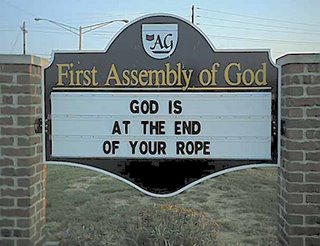 This weekend saw two constrasting forays into the 'religion and public life' debate. The first was a call (by the Evangelical Alliance UK) for Prince Charles to guard his cudgels as Defender of the Christian (and, specifically, Protestant) Faith at his Coronation. The second was, contrastingly, a feature in The Sunday Times asking whether it is time to take 'God out of the state' altogether. In this context Ekklesia is urging a radical change in the way that the debate about religion and politics is framed. Well, actually, we've been urging it for some time. But those who get an adrenalin buzz from a simple, brutal clash between two lumbering monsters called 'belief' and 'secularity' continue to make much of the running, unsurprisingly. This is because most public argument about religion (actually an ethnographic fiction which disguises as much as it reveals) has become pretty much tone-deaf to nuance, and is therefore ready prey for the mutually reinforcing rhetorics of self-assertion and other-bashing. It's neither an edifying nor a life-giving standoff for any concerned, be they wearers of religious or anti-religious clothing. But it will continue until and unless we can find ways of resourcing the 'debate' with more light and less heat, more engaged humanity and less homogenizing abstraction.
This weekend saw two constrasting forays into the 'religion and public life' debate. The first was a call (by the Evangelical Alliance UK) for Prince Charles to guard his cudgels as Defender of the Christian (and, specifically, Protestant) Faith at his Coronation. The second was, contrastingly, a feature in The Sunday Times asking whether it is time to take 'God out of the state' altogether. In this context Ekklesia is urging a radical change in the way that the debate about religion and politics is framed. Well, actually, we've been urging it for some time. But those who get an adrenalin buzz from a simple, brutal clash between two lumbering monsters called 'belief' and 'secularity' continue to make much of the running, unsurprisingly. This is because most public argument about religion (actually an ethnographic fiction which disguises as much as it reveals) has become pretty much tone-deaf to nuance, and is therefore ready prey for the mutually reinforcing rhetorics of self-assertion and other-bashing. It's neither an edifying nor a life-giving standoff for any concerned, be they wearers of religious or anti-religious clothing. But it will continue until and unless we can find ways of resourcing the 'debate' with more light and less heat, more engaged humanity and less homogenizing abstraction.One of the subterranean consequences of the demise of Christendom in the West, of course, is that people both outside and inside church communities have increasingly lost touch with the depth of the language of faith - substituting for it (in some quarters) a blithe assumption that it amounts to little more than a child's comforter, and (in others) that it subsists in the knock-down authority of the Bible, the magesterium, or some very tribal version of religious imagination. Here lies the road to nowhere. Somehow this glorious noticeboard blooper [see picture] sums up where we're all at. Hopefully we'll start to get the joke - and realise that it may be on us.
Meanwhile, on the matter of confusing God and governance, haven't faith groups and secularists yet noticed that civil society exists precisely to provide a mediating space between state power and communities of conviction? And what is the EA on about? It claims to exist for the sake of 'biblical truth'. So how come it is urging Christians to put their trust in princes and their realms, rather than the Lamb Who was Slain (by the powers-that-be, lest we forget)? Neither reason nor the New Testament seem to get much of a look-in.
It's all very odd...
Comment on this post: FaithInSociety

No comments:
Post a Comment